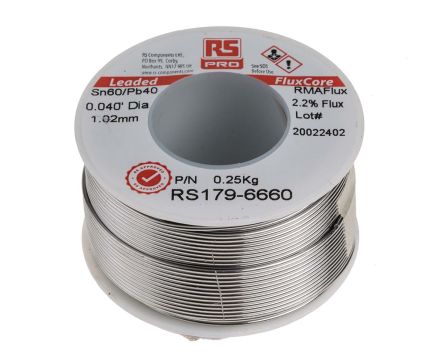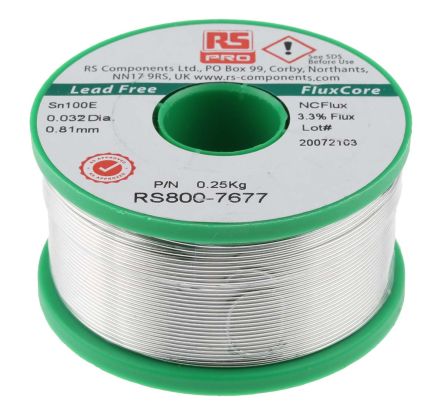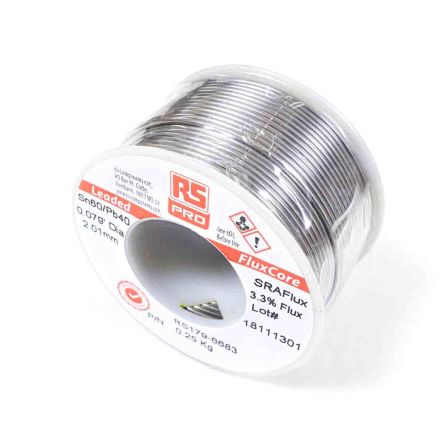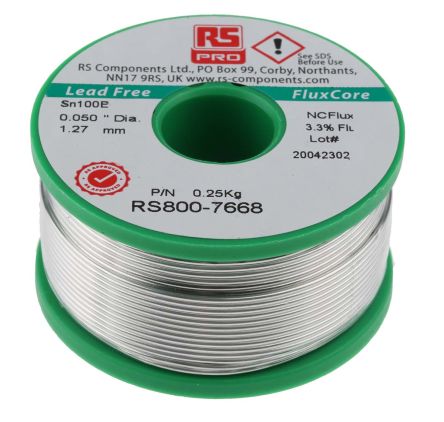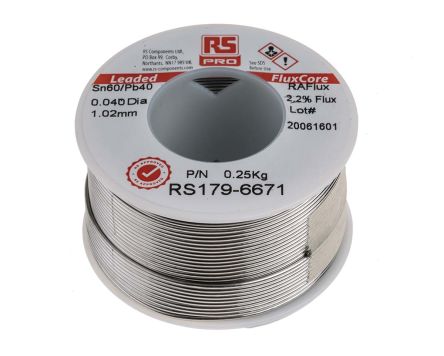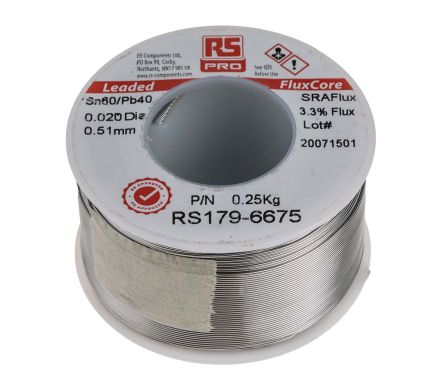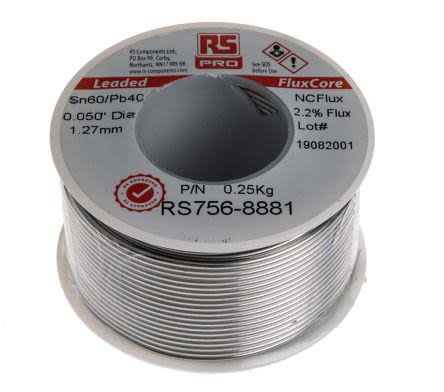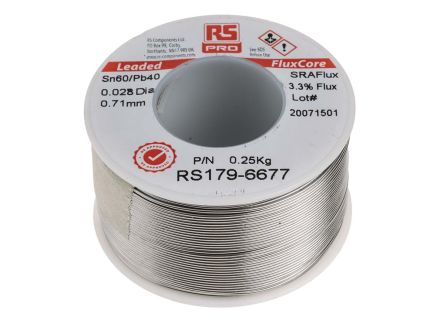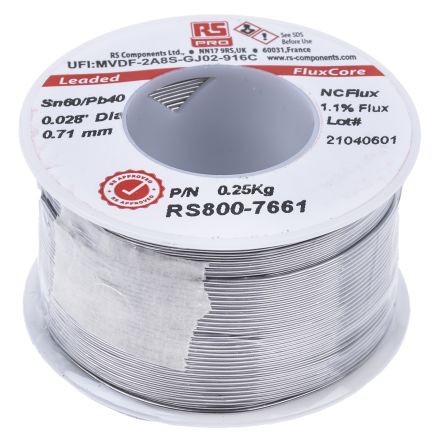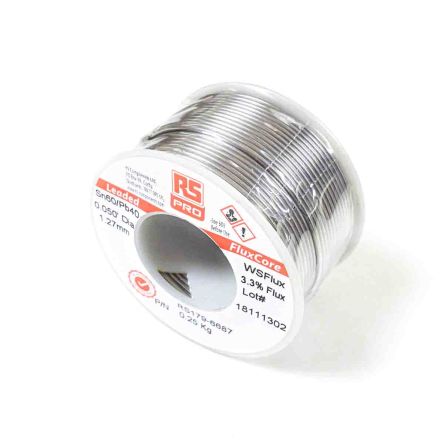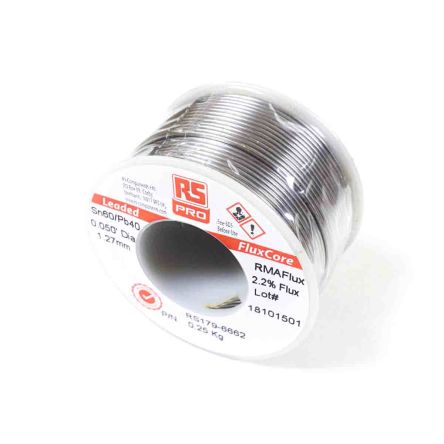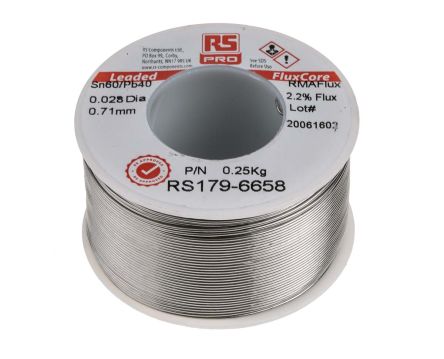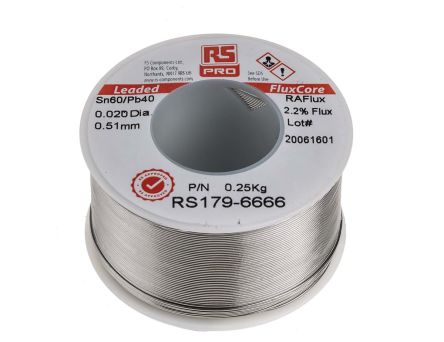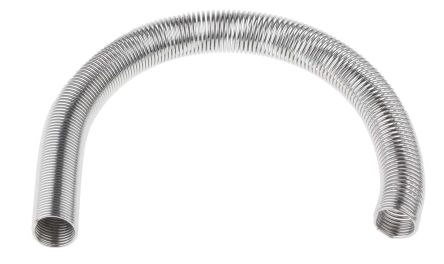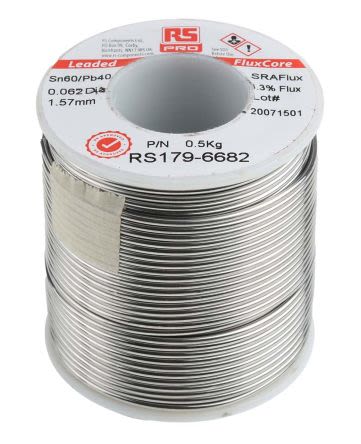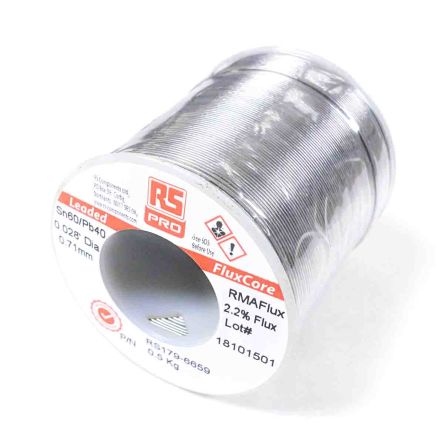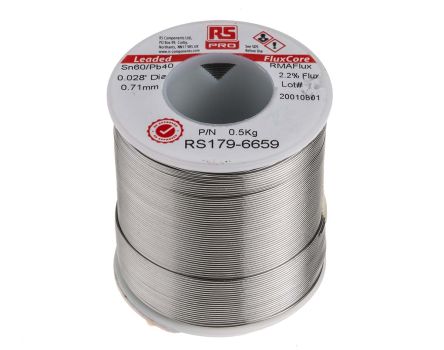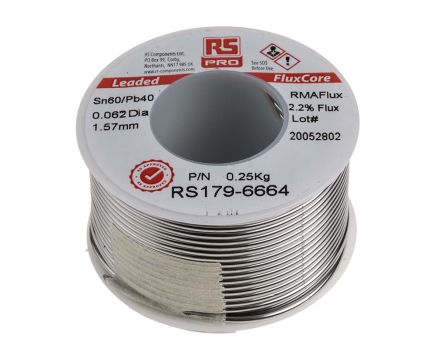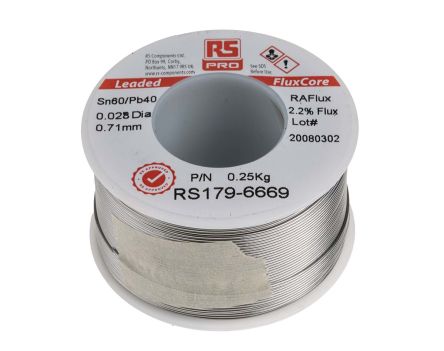- Automation & Control Gear
- Cables & Wires
- Enclosures & Server Racks
- Fuses & Circuit Breakers
- HVAC, Fans & Thermal Management
- Lighting
- Relays & Signal Conditioning
- Switches
- Batteries & Chargers
- Connectors
- Displays & Optoelectronics
- ESD Control, Cleanroom & PCB Prototyping
- Passive Components
- Power Supplies & Transformers
- Raspberry Pi, Arduino, ROCK, STEM Education & Development Tools
- Semiconductors
Solder
Solder, or solder wire, is a fusible metal alloy with a low temperature melting point used to permanently join two metals that have a higher melting point. Soldering is a process commonly used in the electronics industry for PCBs and electronics components, jewellery manufacturing and pipework in plumbing, with the majority of soldering carried out through the use of a soldering iron.
How Solder Wire Works
Solder wire, also known as soldering wire, is a fusible metal alloy used to create permanent bonds between metal components, typically in electrical and electronic applications. The process of soldering involves heating the solder wire to its melting point, allowing it to flow and solidify between the metal surfaces being joined. This creates a metallurgical bond that provides electrical conductivity and mechanical strength.
Solder wire is often composed of tin and lead, but lead-free solders are becoming increasingly common due to environmental concerns. The specific alloy composition determines the melting point and other properties of the solder. Electrical solder wire usually contains a flux core, which helps to clean the metal surfaces and promote the flow of solder during the soldering process. The flux removes oxides and other contaminants, ensuring a strong and reliable solder joint.
Soldering Wire Types
Solder wire is available in various alloys and formulations to meet the needs of different soldering applications. The choice of solder depends on factors such as the metals being joined, the required melting point, and the application's electrical and mechanical requirements. Here are some common types of soldering wire:
Tin-Lead Solder
Tin-lead solder is a traditional type of solder wire that has been widely used for decades. It typically consists of 60% tin and 40% lead (60/40), offering a good balance of strength, electrical conductivity, and a relatively low melting point. This solder is often used for general-purpose electronics soldering.
Lead-Free Solder
Lead-free solder has become increasingly popular due to environmental regulations and health concerns associated with lead. These solders typically use alloys of tin, silver, and copper (SAC), with varying compositions to achieve different melting points and properties. Lead-free solder wire is commonly used in consumer electronics where lead content is restricted.
Silver-Bearing Solder
Silver-bearing solder contains silver in addition to tin and other metals. The addition of silver improves the strength and durability of the solder joint, making it suitable for applications that require high reliability and resistance to vibration and thermal cycling. Silver-bearing solder cable is often used in automotive, aerospace, and industrial applications.
High-Temperature Solder
High-temperature solder is designed for applications that require higher melting points, such as soldering high-temperature components or working with materials that require more heat. These solders typically contain higher percentages of tin or other metals with higher melting points.
Flux-Core Solder
Flux-core solder is a type of soldering wire that contains a flux core within the wire itself. The flux helps to clean the metal surfaces and promote the flow of solder during the soldering process, resulting in stronger and more reliable solder joints. Electrical solder almost always uses a flux core.
Electrical Solder Forms
The majority of solder comes in wire form, with a range of wire diameters available to suit various applications and joints. Solder granules are ideal for soldering machines and tinning crucibles, but these small pellets of solder popular for jewellery making too. Paste solder is ideal for use in printed circuit boards (PCBs) and connecting surface mount electronic components. It is a sticky paste which is applied to a board by printing or painting.
What is Flux?
In order to prevent the oxidation of the metal alloy and ensure a strong electrical connection and high mechanical strength, soldering wire contains a flux, which can be made of different materials. A flux is a chemical agent that will help to reduce metal oxides (return oxidised metals to their original state) and seal out air from the join, preventing any further oxidation.
There are two main types of flux: acid/active, which contains strong acids and is used in plumbing and metal mending, and rosin/passive, which is used in electronics.
Industrial Applications of Electrical Solder
Electrical solder and soldering wire are essential materials in a wide range of industries, enabling the creation of reliable electrical connections and the assembly of electronic components.
Electronics Manufacturing
Solder is the backbone of electronics manufacturing, used to connect components on printed circuit boards (PCBs), assemble electronic devices, and create electrical connections in various electronic products. Electrical solder wire, often with a flux core, is used extensively in this industry for its ability to create strong, conductive joints in miniature electronic components.
Telecommunications
The telecommunications industry relies on solder for assembling and connecting components in network equipment, telecommunication devices, and fiber optic cables. Solder cable and soldering wire are used to create reliable connections that ensure seamless data transmission and communication.
Automotive
Solder is used in the automotive industry for assembling electronic components in vehicles, wiring harnesses, and electrical systems. Electrical solder ensures reliable connections in various automotive applications, including engine control units, sensors, and lighting systems.
Aerospace
Solder plays a critical role in aerospace applications, where reliability and performance are paramount. It is used for assembling electronic systems in aircraft, spacecraft, and satellites, ensuring the proper functioning of critical components in demanding environments.
Medical Devices
Solder is used in the manufacturing of medical devices, such as pacemakers, defibrillators, and other electronic medical equipment. The precise and reliable connections created by soldering wire ensure the proper functioning of these critical devices.
Renewable Energy
Solder is used in the renewable energy industry for assembling solar panels, wind turbines, and other renewable energy systems. Electrical solder ensures efficient and reliable connections in these systems, contributing to the generation of clean energy.
How to Choose the Right Soldering Wire
Here are some key factors to consider when you buy solder wire:
Alloy Composition
The alloy composition of the solder determines its melting point, strength, and other properties. Choose an alloy that is suitable for the metals being joined and the application requirements. Common alloys include tin-lead, lead-free (SAC), and silver-bearing solders.
Diameter
Solder wire comes in various diameters. Choose a diameter that is appropriate for the size of the components and the soldering iron being used. Thicker soldering wire is generally used for larger components and higher heat applications.
Flux Core
Consider whether you need solder wire with a flux core. The flux helps to clean the metal surfaces and promote the flow of solder, resulting in stronger and more reliable solder joints. Electrical solder wire typically includes a flux core.
Melting Point
Choose a solder with a melting point that is suitable for the materials being joined and the soldering iron being used. Lower melting point solders are generally easier to work with, while higher melting point soldering wires are required for certain applications.
Regulations and Standards
Be aware of any regulations or standards that may apply to your application, such as restrictions on lead content in certain industries.
Trusted Solder Wire Manufacturer, Supplier & Distributor in Australia
Need to buy solder for your next project? RS is a leading supplier of solder in Australia, offering a comprehensive range of high-quality soldering wire and electrical solder wire for various applications.
Our selection includes a variety of soldering wire types, including lead-free solder, tin-lead solder, silver-bearing solder, and specialised solders for high-temperature applications. We also offer solder wire in various diameters and with different flux core options to meet your specific soldering requirements.
Buy solder online today from popular brands like Multicore, Weller, and our in-house brand, RS PRO. Experience our competitive prices and fast delivery across Australia. For more details on our delivery services and fees, please visit our Delivery Page.

